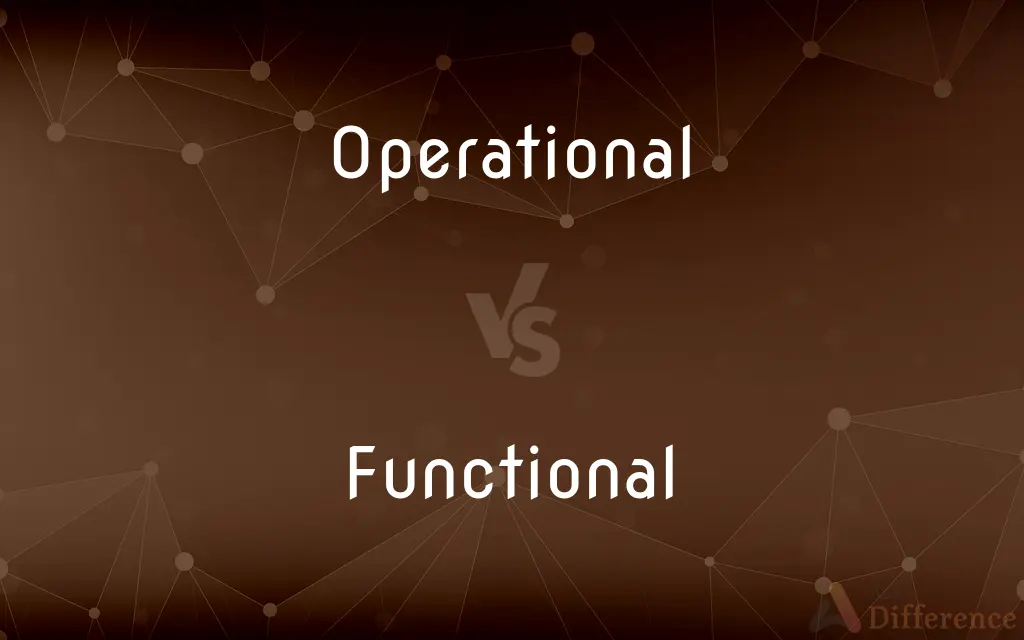Operational vs. Functional — What's the Difference?
By Urooj Arif & Fiza Rafique — Updated on February 26, 2024
Operational focuses on the activities and processes that keep an entity running daily, while functional refers to the specific roles or duties within an organization that contribute to its overall operations.

Difference Between Operational and Functional
Table of Contents
ADVERTISEMENT
Key Differences
Operational activities are concerned with the execution and management of day-to-day tasks necessary for an organization's survival and efficiency. This includes processes, systems, and practices that ensure the smooth running of business operations. In contrast, functional aspects delineate the specialized tasks and responsibilities assigned to different departments or units within an organization, such as marketing, finance, or HR, each contributing to the organization's goals through their specific expertise.
Operational efficiency is a broad concept that encompasses the effectiveness of all processes across an organization, aiming for optimized performance and cost reduction. Functional efficiency, however, focuses on optimizing the performance and output of specific departments or roles, enhancing their contribution to the organizational goals.
The operational perspective is holistic, looking at how different parts of the organization work together seamlessly. It's about the "how" of the organization's workings—how it operates on a daily basis. Meanwhile, the functional perspective is more compartmentalized, concentrating on the "what" - what specific tasks and objectives each department has and how they contribute to the larger picture.
Operational strategies often involve short-term planning and adjustments to maintain or improve the organization's overall running. These can include changes to workflows, adopting new technologies, or improving supply chain logistics. Functional strategies are typically more focused on long-term goals within each department, like developing new product lines in R&D or enhancing customer service protocols.
Operational improvements are usually aimed at enhancing overall productivity and reducing costs, potentially affecting the entire organization. Functional improvements, on the other hand, target specific areas for growth or efficiency, such as increasing sales through marketing campaigns or improving financial health through cost management strategies.
ADVERTISEMENT
Comparison Chart
Focus
Daily activities and processes
Specific roles and duties within departments
Objective
Ensure smooth running of business operations
Optimize performance in specialized areas
Perspective
Holistic, across the organization
Compartmentalized, within specific departments
Strategy
Often short-term, aiming for immediate efficiency
More long-term, focusing on departmental goals
Improvement Goals
Enhancing productivity and reducing costs organization-wide
Targeting specific areas for growth or efficiency
Compare with Definitions
Operational
Involving maintenance and administration tasks.
Regular operational meetings help identify bottlenecks.
Functional
Focused on the contributions to the overall goals.
Functional improvements can lead to significant gains in efficiency.
Operational
Relating to the ongoing operations of a business.
Operational challenges can impact the bottom line.
Functional
Relating to the specific roles or duties within an organization.
Each department has its functional expertise.
Operational
Of or relating to operations, especially military operations.
Functional
Involving the distinct areas of business operation.
The functional areas of the company work together on the project.
Operational
Pertaining to a process or series of actions for achieving a result;
Operational difficulties
They assumed their operational positions
Functional
Concerned with specialized tasks within the business.
Functional strategies aim at enhancing departmental outputs.
Operational
Involving the functioning parts of an operation.
The team conducted an operational review to streamline processes.
Functional
Designed for or adapted to a function or use;
Functional education selects knowledge that is concrete and usable rather than abstract and theoretical
Functional architecture
Operational
Concerned with the execution of strategic plans.
Operational teams are crucial for implementing changes.
Functional
Pertaining to the activities of a particular department.
Functional managers are responsible for their team’s performance.
Operational
Pertaining to the activities that keep an organization running daily.
Operational efficiency is key to reducing costs.
Functional
Designed for or capable of a particular function or use;
A style of writing in which every word is functional
Functional architecture
Operational
Of or relating to an operation or a series of operations.
Functional
Of or relating to a function.
Operational
Fit for proper functioning; ready for use
An operational aircraft.
Functional
Designed for or adapted to a particular function or use
Functional architecture.
Operational
Of or intended for or involved in military operations. Opposite of nonoperational.
Functional
Capable of performing a function; operative
A functional set of brakes.
Functional
Only for functional purposes, notably in architecture
A functional construction element generally must meet higher technical but lower aesthetical requirements
Functional
Pertaining to, or connected with, a function or duty; official.
Functional
Pertaining to the function of an organ or part, or to the functions in general; involving or affecting function rather than physiology; as, functional deafness; a functional disease. See functional disease, below.
Functional
Designed for or capable of a particular function or use; as, a style of writing in which every word is functional; functional architecture.
Functional
Designed to emphasize practical utility rather than artistic or aesthetic purposes; as, functional education selects knowledge that is concrete and usable rather than abstract and theoretical; functional architecture; an amateurish device, crude but functional.
Functional
(of e.g. a machine) performing or capable of performing;
In running (or working) order
A functional set of brakes
Common Curiosities
Can operational and functional objectives overlap?
Yes, operational and functional objectives can overlap when functional department goals align with broader organizational operational efficiency goals.
How do operational roles differ from functional roles?
Operational roles focus on overseeing the day-to-day running of the business, while functional roles specialize in specific areas like finance, marketing, or HR.
How do companies measure operational and functional performance?
Companies use various metrics, such as KPIs (Key Performance Indicators), to measure both operational and functional performance, assessing efficiency, productivity, and goal alignment.
Is operational efficiency more important than functional efficiency?
Both are important; operational efficiency ensures the organization runs smoothly as a whole, while functional efficiency focuses on optimizing specific departmental contributions.
Can a functional strategy impact the overall operations of a company?
Yes, effective functional strategies can significantly impact the overall operations by improving efficiency, productivity, and profitability in specific areas.
Do all organizations use the terms "operational" and "functional" in the same way?
While the basic distinctions between operational and functional are widely recognized, the specific use of these terms can vary depending on the organization's structure and industry.
How do technological advancements affect operational and functional efficiency?
Technological advancements can significantly improve both operational and functional efficiency by streamlining processes, enhancing communication, and automating routine tasks.
Are operational improvements more costly than functional improvements?
Not necessarily; the cost depends on the scope and nature of the improvements. Operational improvements can be wide-ranging and costly, but targeted functional improvements can also require significant investment.
How often should operational and functional strategies be reviewed?
Strategies should be regularly reviewed and adjusted based on performance data, market changes, and organizational goals, typically on an annual basis or as needed.
Can a small business have distinct operational and functional areas?
Yes, even small businesses can distinguish between operational and functional areas, though they may be less formalized than in larger organizations.
Can outsourcing affect a company’s operational and functional efficiency?
Yes, outsourcing can affect both by potentially improving efficiency and cost-effectiveness in certain operational and functional areas, though it also requires effective management and integration into the overall strategy.
Is it possible for functional changes to have no impact on operational efficiency?
It's rare, as most functional changes tend to have some impact on operational efficiency, either directly or indirectly, by improving specific aspects of the organization's performance.
How do new market trends influence operational and functional strategies?
New market trends can lead organizations to adjust their operational and functional strategies to remain competitive, such as adopting new technologies or changing consumer demands.
What role do leadership and management play in operational and functional efficiency?
Leadership and management play critical roles in setting the vision, aligning goals, and ensuring that both operational and functional activities are effectively executed and optimized.
How do operational and functional priorities change during a crisis?
During a crisis, operational priorities may shift towards immediate survival strategies, while functional areas might focus on adapting their strategies to support these efforts.
Share Your Discovery

Previous Comparison
Lecturership vs. Lectureship
Next Comparison
Spinach vs. PalakAuthor Spotlight
Written by
Urooj ArifUrooj is a skilled content writer at Ask Difference, known for her exceptional ability to simplify complex topics into engaging and informative content. With a passion for research and a flair for clear, concise writing, she consistently delivers articles that resonate with our diverse audience.
Co-written by
Fiza RafiqueFiza Rafique is a skilled content writer at AskDifference.com, where she meticulously refines and enhances written pieces. Drawing from her vast editorial expertise, Fiza ensures clarity, accuracy, and precision in every article. Passionate about language, she continually seeks to elevate the quality of content for readers worldwide.
















































